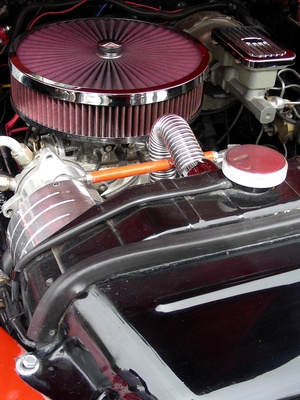
The 7.3-liter diesel engine was first installed by Ford in its vehicles in 1994. Given the name Power Stroke in that year, the engine was used in Ford's F-series trucks as well as various vans, commercial trucks and SUVs. Ford stopped producing these engine in 2003, which means if you have one, your vehicle is probably fairly old. One of the best ways to improve its gas mileage is by installing upgraded auto parts.
Lower the wind resistance of your Ford truck. Drive with the windows closed on highways, if practicable. Install a cover over the bed of your truck to streamline air flow. The covers can cost up to $500 or so, but will pay off in the long run. Better aerodynamics mean better gas mileage.
Replace the air filter in your Ford truck with the new and improved ones, and keep it clean. Although they cost twice as much as traditional air filters, they are less likely to clog and last much longer. An improved air filer will increase the air flow to the engine. The more air an engine receives, the less fuel it consumes.
Install a diesel performance module or chip in your Ford truck. There are a variety of these devices available on the Internet or at auto supply stores. These modules improve engine performance by improving the fuel injection system.
Service your truck on a regular basis. Change the oil every 3,000 miles and tune it up at the intervals recommended in the owner's manual. Tell your mechanic to the check your truck's engine compression and fuel pressure regulator. Both will reduce fuel mileage if they are not at peak efficiency.
Lighten your truck has much as possible. Remove any items from the bed or cab that are not necessary. Do not install oversized wheels and tires, or show-off items like chrome bars and extra lights. All of them will add to the weight of the truck and increase fuel usage.
Maintain the proper inflation in your tires. Tires that are not properly inflated will increase fuel consumption. The same is true of tires that lack tread or are not properly balanced and aligned.
Follow correct driving habits. Don't warm up your engine for longer than needed. Obey the speed limits and avoid revving the engine. Use your truck's overdrive gearing, which decreases the speed of the engine and the amount of fuel you use. Turn your air conditioning on only when necessary. Combine multiple errands into one. Use your cruise control on the highway.
Replace your exhaust system with a new one designed specifically for diesel trucks. A good exhaust system allows the engine to operate more efficiently by improving its exhaust flow with wider and straighter pipes. Better exhaust flow improves power and fuel mileage.